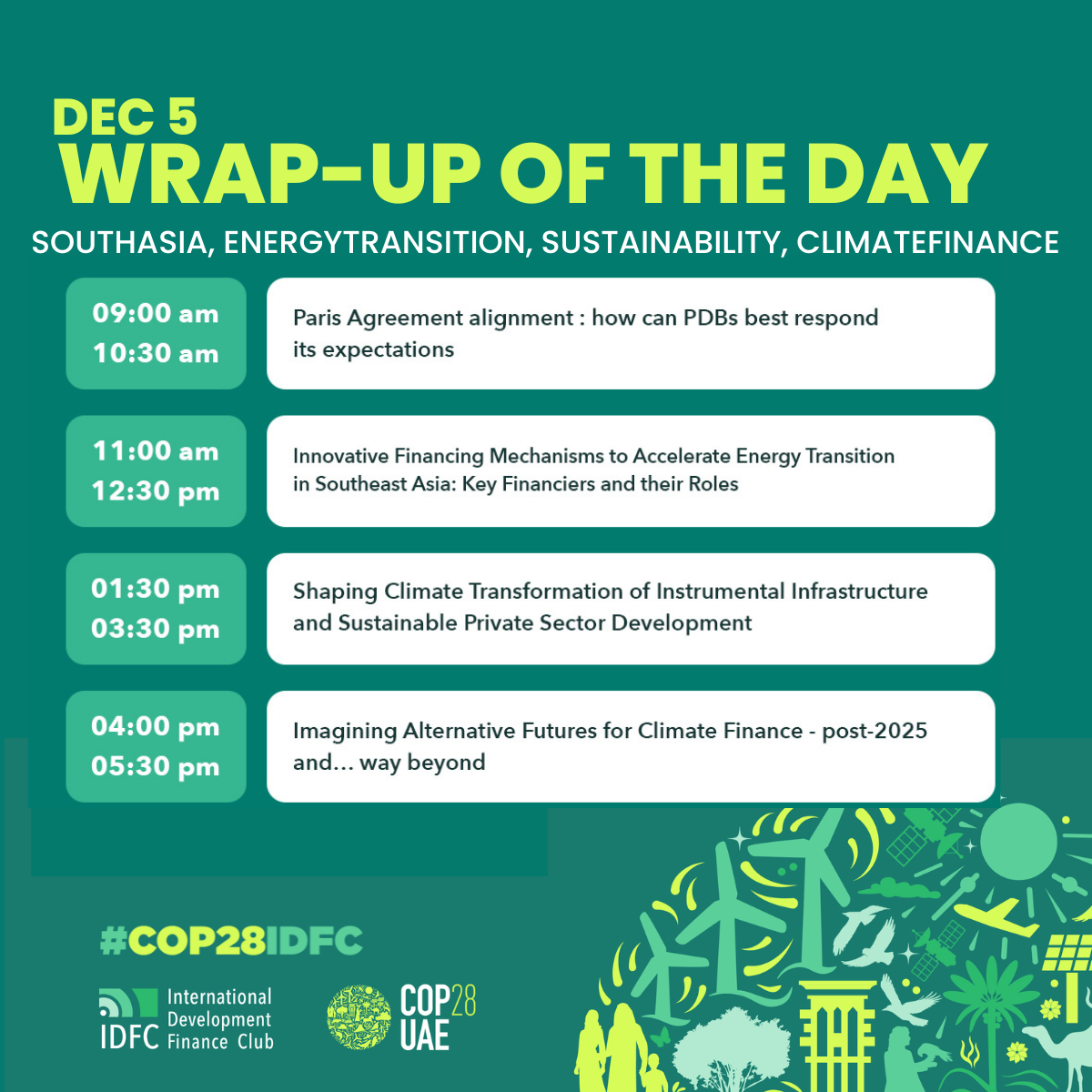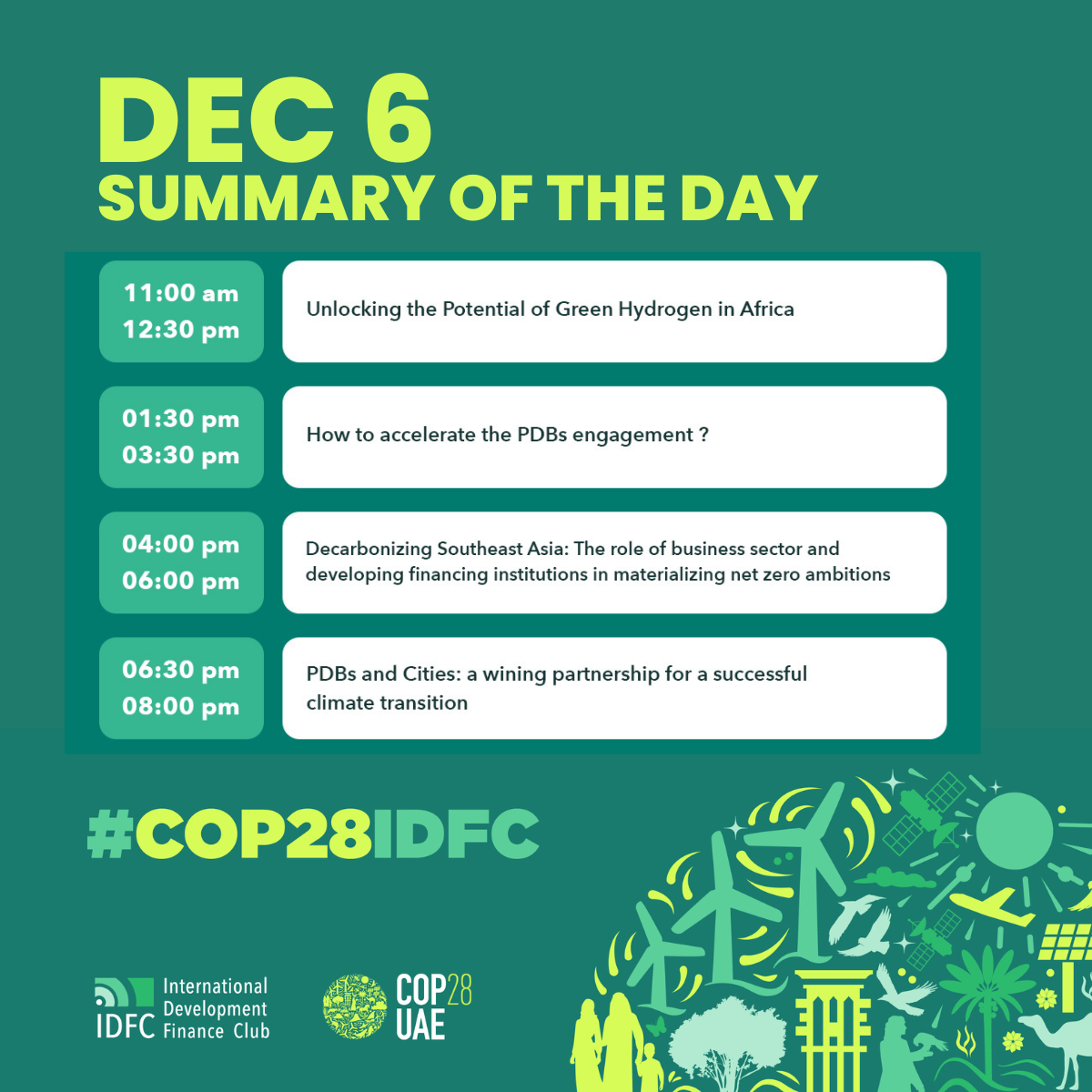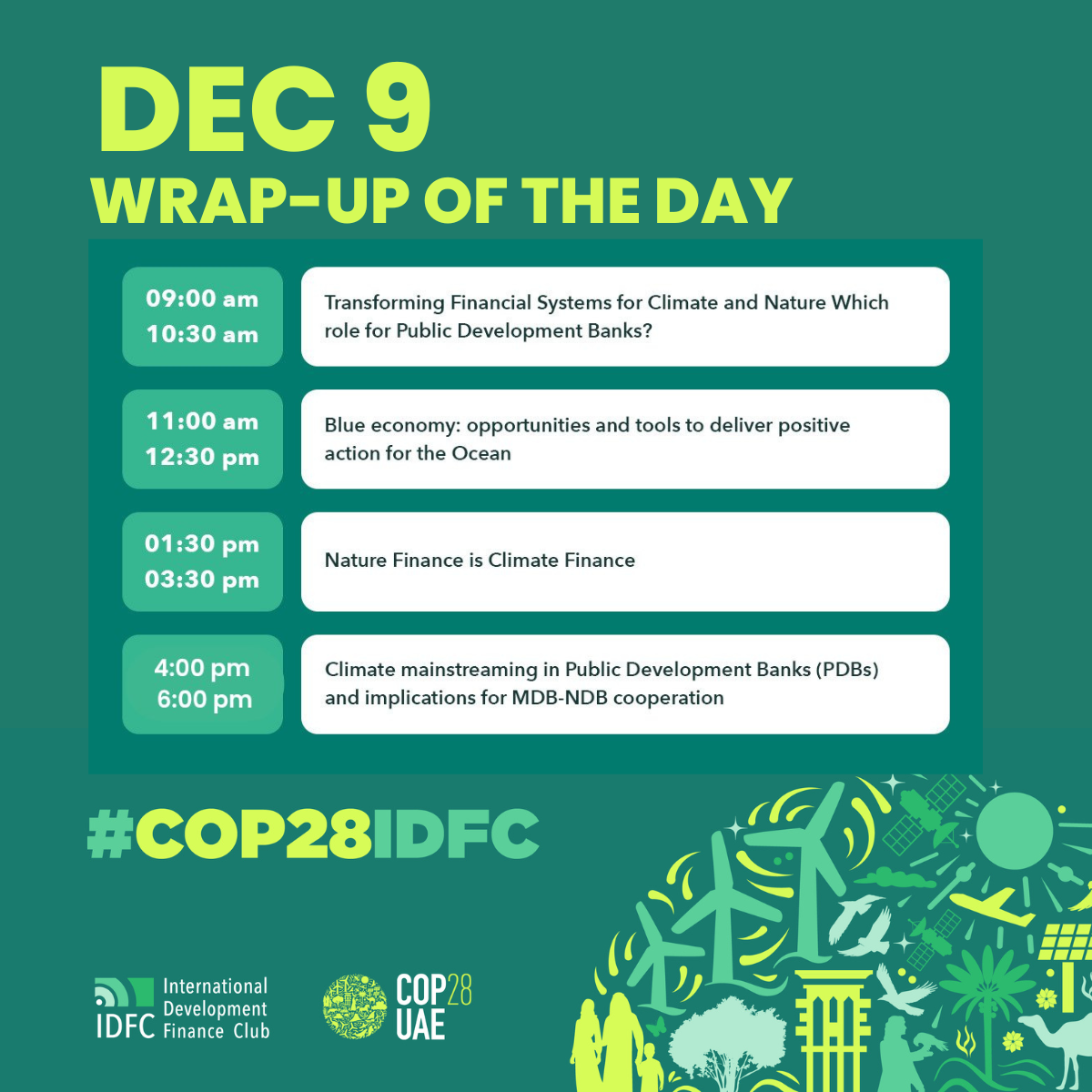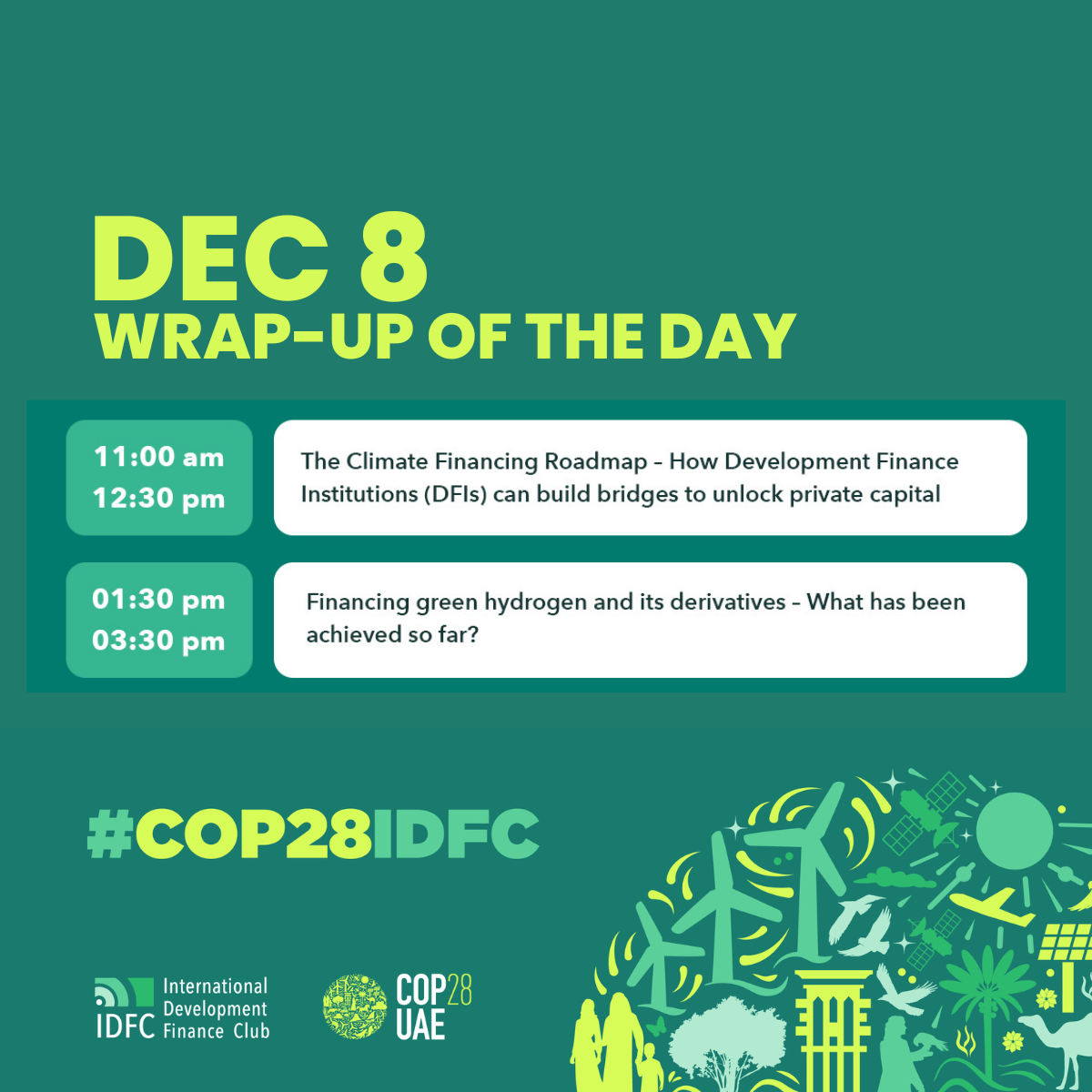
COP28IDFC DEC5 – Wrap up
5 December 2023New day, new agenda on #COP28IDFC Pavilion.
Find below the topics tackled today and a summary for each, 4 events on #PDBs, #SouthAsia, #energytransition, #sustainability, #climatefinance
Watch the replay here:
9AM Paris Agreement alignment: how can PDBs best respond its expectations
PDBs and MDBs gathered to discuss approaches on Paris Agreement Alignment and future role and place of Climate finance in this context.
The discussions pointed out:
- The fundamental importance of country low carbon and resilient development pathways -based approaches given i) the development mandate of PDBs and their position vis à vis Paris Agreement parties ii) the “contribution to structural effects” ambitions beyond own impacts and beyond mere consistency of finance flows
- The importance of support to policies, technical assistance, local financial actors for structuring re-direction objectives entailed by Art. 2.1c
- The importance of looking at added value of Climate finance in terms of transformational potential
- The interest at project level but also limitations when aggregated of direct-impact quantitative approaches
Our @DGvindadze spoke at “Paris agreement alignment: how can Public Development Banks best respond to expectations of Paris Agreement?”
Hosted by @IDFC_Network today at #COP28 pic.twitter.com/2biru069Ue— The EBRD (@EBRD) December 5, 2023
Below you can find some key points from 3 panelists:
Alexis Bonnel from Agence Française de Developpement
IDFC contributions et key role:
- Largest provider of public development and climate finance globally
- Committed promoter of climate mainstreaming within financial institutions and the alignment of finance with the Paris Agreement
- Trusted group of development bank practicioners
Paper out: Contribution ot the UNFCCC post-2025 climate finance dialogues
IDFC’s 10+ year journey of integrating climate:
- Climate finance volumes: projects with climate co-benefits / tracking -> doing good things
- Climate mainstreaming: portfolios, strategies, integration at institutional level -> doing things right
- Climate alignment: contributing to financial systems’ reorientation -> doing the right things
Hervé Breton, Facility 2050 coordinator, AFD
Until 2017, AFD climate action was ambitious but very much focused on providing climate finance and looking at GHG impacts of its financed projects.
With the Paris Agreement, it became clear that it could not content themselves with just that, it needed to make sure that all financing work on country transitions contributes to the redirection to financial flows beyond AFD’s own flows
There is a need to strengthen that and came up with 3 pillars for the climate strategy to make sure all financing consistent: provision of climate finance and trying to contribute to the redirection of flows beyond
We also need to know about what the transition means and support countries in the elaboration of LTSs
Dimitri Gvindadze, Director Climate Strategy & Regional Delivery, EBRD
The importance is to engage with the big sponsors in the region and try to finance PDBs and distribute.
When it comes to adaptation, it’s difficult to source commercially viable adaptation projects
BB3 , EBRD provides 6 billion of climate finance and mobilise more.
Last year they launched the Nexus NWAFE in Egypt to get to wind, solar, and other renewable capacity.
Mariem Dkhil, Director Green Transition, Crédit Agricole du Maroc
Objective: take the climate finance where it is available to channel it to the final beneficaries
Need to avoid too much criteria that are not feasible on the field
Sometimes DFIs put too much criteria that make it difficult to find projects
We know climate finance is there but sometimes difficult to access it
Technical assistance needed for the banks but also for the final beneficiaries
Need to have concessional rates because when you have several intermediaires the final client will pay a high cost
11 AM Innovative Financing Mechanisms to Accelerate Energy Transition in Southeast Asia: Key Financiers and their Roles
A little wrap-up of the discussions with 4 key takeaways:
1️⃣ working together on various issues
2️⃣ reviewing the way we manage risk
3️⃣ how we approach the renewable environment
4️⃣ how to succeed in this region
#COP28IDFC pic.twitter.com/SI327yspsS— International Development Finance Club (@IDFC_Network) December 5, 2023
1:30 PM “Shaping Climate Transformation of Instrumental Infrastructure and Sustainable Private Sector Development”
🎙️Quote | “As a manager of critical infrastructure investments, we feel a strong responsibility for making real commitments to slow global warming.” Kim Fejfer, Managing Partner & CEO, A.P. Moller Capital @Maersk #COP28 #cop28idfc pic.twitter.com/OQbrTS95tp
— International Development Finance Club (@IDFC_Network) December 5, 2023
🎙️Sameh Shenouda Chief Investment Officer @africa_finance
“Climate change is a global issue, affecting every corner of the world, including Africa. Africa is particularly vulnerable to climate change due to its reliance on agriculture, limited resources, and fragile ecosystems.” pic.twitter.com/AjYbcfvDIG— International Development Finance Club (@IDFC_Network) December 5, 2023
4PM – Imagining Alternative Futures for Climate Finance – post-2025 and… way beyond
This session invited panelists to imagine alternative, radical systemic evolutions of climate finance.
Speakers:
- Daniel Kaplan, co-founder, Plurality University Network
- Nadia Alter, Tim Reutemann, co-founders, Sci-Fi Economics Lab, ClimateGains
- Beatriz Vaca, Chief Operating Officer, Microrisk
- Modupe Famakinwa, Vice President, Corporate Funding, Africa Finance Corporation (AFC)
- Alexander Atarodi, Forum on Foresight for Sustainable Finance, Team Lead foresight, OECD/DCD
Moderator: Alexis Bonnel, Strategy & Foresight, AFD
The discussion started with a presentation of the outcomes a recent collective creative foresight exploration about the futures of climate and sustainable finance. The approach helped mobilize resources of imagination to envisage radical, systemic changes and helped raise new, unconventional questions about climate finance and its evolution. What if the focus of Finance should no longer be on investment? What if scale and scaling were a problematic way of looking at sustainable projects? What if the focus on “Impact” was counter-productive? What if catastrophe finance becomes a key driver for systemic transformation?
Finding alternatives to the current economic and financial models is of the essence. The discussion also touched on critical foresight questions from the perspective of the different panelists.
🎙️QUOTE| Alexander Atarodi @OECD_Centre “the role of financial players is to take an interest in experts, to provide tools and platforms rather than just money”#COP28IDFC pic.twitter.com/bpdhdTiOQ5
— International Development Finance Club (@IDFC_Network) December 5, 2023
“We project the future in Africa as an investment case, where we can use #blendedfinance to make things accessible where projects are bankable and looking beyond risk in #Africa” Modupe Famakinwa VP Climate Funding @africa_finance pic.twitter.com/iq590AgsxU
— International Development Finance Club (@IDFC_Network) December 5, 2023


